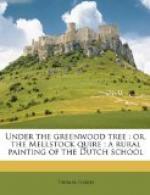“And that’s the boot, then,” continued its mender imaginatively, “that she’ll walk to church in to-morrow morning. I don’t care to mend boots I don’t make; but there’s no knowing what it may lead to, and her father always comes to me.”
There, between the cider-mug and the candle, stood this interesting receptacle of the little unknown’s foot; and a very pretty boot it was. A character, in fact—the flexible bend at the instep, the rounded localities of the small nestling toes, scratches from careless scampers now forgotten—all, as repeated in the tell-tale leather, evidencing a nature and a bias. Dick surveyed it with a delicate feeling that he had no right to do so without having first asked the owner of the foot’s permission.
“Now, neighbours, though no common eye can see it,” the shoemaker went on, “a man in the trade can see the likeness between this boot and that last, although that is so deformed as hardly to recall one of God’s creatures, and this is one of as pretty a pair as you’d get for ten-and-sixpence in Casterbridge. To you, nothing; but ’tis father’s voot and daughter’s voot to me, as plain as houses.”
“I don’t doubt there’s a likeness, Master Penny—a mild likeness—a fantastical likeness,” said Spinks. “But I han’t got imagination enough to see it, perhaps.”
Mr. Penny adjusted his spectacles.
“Now, I’ll tell ye what happened to me once on this very point. You used to know Johnson the dairyman, William?”
“Ay, sure; I did.”
“Well, ’twasn’t opposite his house, but a little lower down—by his paddock, in front o’ Parkmaze Pool. I was a-bearing across towards Bloom’s End, and lo and behold, there was a man just brought out o’ the Pool, dead; he had un’rayed for a dip, but not being able to pitch it just there had gone in flop over his head. Men looked at en; women looked at en; children looked at en; nobody knowed en. He was covered wi’ a sheet; but I catched sight of his voot, just showing out as they carried en along. ‘I don’t care what name that man went by,’ I said, in my way, ’but he’s John Woodward’s brother; I can swear to the family voot.’ At that very moment up comes John Woodward, weeping and teaving, ‘I’ve lost my brother! I’ve lost my brother!’”
“Only to think of that!” said Mrs. Dewy.
“’Tis well enough to know this foot and that foot,” said Mr. Spinks. “’Tis long-headed, in fact, as far as feet do go. I know little, ’tis true—I say no more; but show me a man’s foot, and I’ll tell you that man’s heart.”
“You must be a cleverer feller, then, than mankind in jineral,” said the tranter.
“Well, that’s nothing for me to speak of,” returned Mr. Spinks. “A man lives and learns. Maybe I’ve read a leaf or two in my time. I don’t wish to say anything large, mind you; but nevertheless, maybe I have.”
“Yes, I know,” said Michael soothingly, “and all the parish knows, that ye’ve read sommat of everything a’most, and have been a great filler of young folks’ brains. Learning’s a worthy thing, and ye’ve got it, Master Spinks.”




